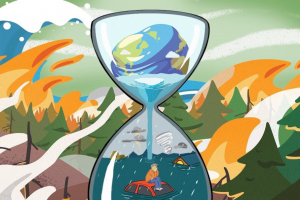In the United Arab Emirates, history is the next big thing.
he U.A.E. has been celebrating its golden jubilee this year, and with the imminent opening of the Museum of the Future and the highly anticipated launch of the delayed Expo 2020 Dubai, the young country is thinking big about what’s to come.
But it’s also starting to look more at the ancient past, with a number of sites across the country revealing forgotten secrets and unsolved mysteries to curious visitors.
Saruq Al-Hadid
According to Mansour Boraik, principal archaeology specialist for Dubai, the 2002 discovery of this Bronze Age settlement in the emirate’s desert turned our knowledge of ancient life in southern Arabia upside down. “It was once thought that five thousand years ago, people had moved to the coast to fish and trade,” Boraik explains, “but Saruq Al-Hadid was a tree-filled oasis, and people hunted animals and settled there.” Occupied from the third millennium B.C. until it was abandoned in the Iron Age, this early center of metallurgy left behind a baffling amount of things. More than 12,000 items have been uncovered, including daggers, seals, gold jewelry, and, perhaps most intriguingly, hundreds of metal snakes. The Saruq Al-Hadid Archaeology Museum on the Dubai Creek houses these and other findings.
Jebel Hafit Desert Park
Al Ain, in the emirate of Abu Dhabi, has been a crucial desert oasis for millennia. It’s also the location of Abu Dhabi‘s highest mountain, Jebel Hafit, and the Jebel Hafit Desert Park: a recently opened site that showcases the various societies that have inhabited the area. Clearly marked hiking trails lead to 122 beehive-shaped stone tombs, built by a semi-nomadic Bronze Age people more than 5,000 years ago. Archaeologists have explored many of them, while others still contain potential treasures; Mesopotamian ceramics uncovered here prove that Al Ain was a stop on an ancient trade route. The tombs are best seen in the honey-colored light of the early morning — wake up for the desert sunrise after spending the night in one of the park’s dome tents. Simple and tasty options are available at the onsite food truck, but for the real desert camp experience, grill dinner over your personal firepit.
Jumeirah Archaeological Site
In this beachside Dubai neighborhood lie the ruins of a ninth-century city, the oldest early-Islamic-era site discovered in the U.A.E. Stop by the new Jumeirah Archaeological Site visitors’ center to view finds from the dig, including carnelian beads, glazed jars, and silver coins, before hopping on a guided buggy tour through the remains of a market, mosque, and even the city’s first “hotel” — a thousand-year-old caravanserai for traders from Oman, Persia, and beyond. The onsite Arabian Tea House is the ideal spot to sip a sweet karak chai and ruminate on the remaining mysteries. Archaeologists are still scratching their heads over where the inhabitants obtained fresh water: no evidence of wells or springs has ever been found.
Mleiha Archaeological Center
In the rolling red dunes of Sharjah, the emirate just north of Dubai, lies an area with a significant claim to fame. Archaeological finds in Mleiha date back 130,000 years — indicating that this may have been one of the first places that modern humans came when they left Africa. The excellent archaeological center showcases these artifacts as well as others from the later Neolithic, Bronze, and Iron Ages, including flint tools from the sixth millennium B.C., Bronze Age red-coral necklaces, and foreign coins from the first century. A four-wheel-drive tour takes you to a stone outcrop full of fossilized marine gastropods, followed by stargazing through a high-powered telescope from a private Bedouin-style tent. Time travel at its best.



